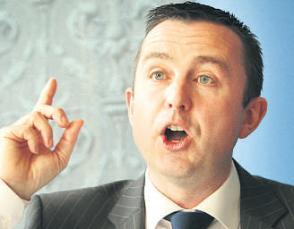Cuts in special needs 'at odds with Education Act'

The Joint Committee on Education and Science met today in Leinster House to discuss the effects of reductions in the number of teachers and Special Needs Assistants (SNAs). Chaired by Green Party TD Paul Gogarty, there were calls for the reversal of recent cuts to SNAs by principals of both special needs schools and mainstream schools.
(Photo: Fine Gael spokesperson on Education, Brian Hayes)
Despite the publication of the Education for Persons with Special Educational Needs (EPSEN) Report in 2004, the Committee heard that there had been a failure to implement its ideas. The EPSEN Report stated that it was necessary “to make a further provision [...] for the education of people with special educational needs, to provide that the education of people with such needs shall, wherever possible, take place in an inclusive environment with those who do not have such needs”.
{saudioplayer}Annmarie_MeliaSNA.mp3{/saudioplayer}
(Audio: Shane Creevy interviews Ms. Annmarie Melia, SNA in Trim, Co. Meath)
The National Council for Special needs Education (NCSE) was established in 2003 to implement strategies to enhance special needs learning in Ireland. The Council was founded as an independent statutory body by the then Minister for Education and Science.
On its official website the NCSE says that it "has concentrated on developing an organisation which provides a timely and efficient service to schools in sanctioning teaching and Special Needs Assistant (SNA) resources to support children with special educational needs.”
But Mr. Brendan Hennigan, principal of St. Joseph’s Special National School, Balrothery, Co. Dublin, told the Committee that his school has "been informed by the NCSE that up to 23 of our students should not be enrolled... that we should only enrol children who fall within the narrow band of intellectual function only - that’s mild general learning disabilities without any associated disabilities, and we find this at odds with the Education Act”.
Fiona Byrne, principal of St Anthony’s Special School, Castlebar, Co. Mayo, told the Committee, “The teachers and the principals [...] professional opinion should be given as great a credence and weight as that of medical and health professionals, who may not even have set foot in to our schools”.
Pat Curtin, CEO of the NCSE, came under significant pressure from the Committee, in particular from Fine Gael Spokesperson for Education Brian Hayes (as relayed in the audio podcast below). Mr. Curtin refused to give specific numbers for the amount of SNAs who lost their jobs since the recent budget cuts, much to the consternation of the Committee, although he did say that “EPSEN if fully implemented would confer rights on children with special educational needs in a number of specific areas particularly in relation to assessment and the provision of an individual education plan and to an appeal process”.
{saudioplayer}SNA Education.mp3{/saudioplayer}
(Audio: excerpts from the meeting of The Joint Committee on Education and Science, 11 March 2010)
Beverly Flynn denounced the firing of SNAs during the school year. Addressing Mr Curtin, she said “How can you justify withdrawing any SNAs from school mid-term when they make their plans at the start of the year for the duration of the year? If you withdraw a teacher from a school it’s done at the end of the year. [...] I think it’s fair to assume that any child that starts in a school at the start of the year, if that child is still in the school for the duration of that year how could you possibly justify taking away any resource mid-term?”.
Mr Curtin said that care needs are constantly changing.
Senator Brendan Ryan, however, backed Beverley Flynn, saying that “Making SNAs redundant and paying them dole, instead of helping the kids that need the attention, is a stupid economy”.
David Stanton strongly criticised the appeals process. The Appeals Board was set up in 2007 but has not operated until recent weeks. The Committee strongly urged the NCSE to make the Appeals Board an independent body. Mr. Stanton said, “It’s very unfair [...] to make a decision without having an appeals structure in place for parents or schools”.
Assistant General Secretary of the IMPACT trade union Philip Mullen said “We believe that the political will is to provide for the needs of these children and that the people within the NCSE and the Department of Education, we all share the same goal but for some reason it just isn’t happening and I think we should be focusing on ensuring that what we all want is delivered at the end of this, rather than getting bogged down in the detail of a blame game”.
